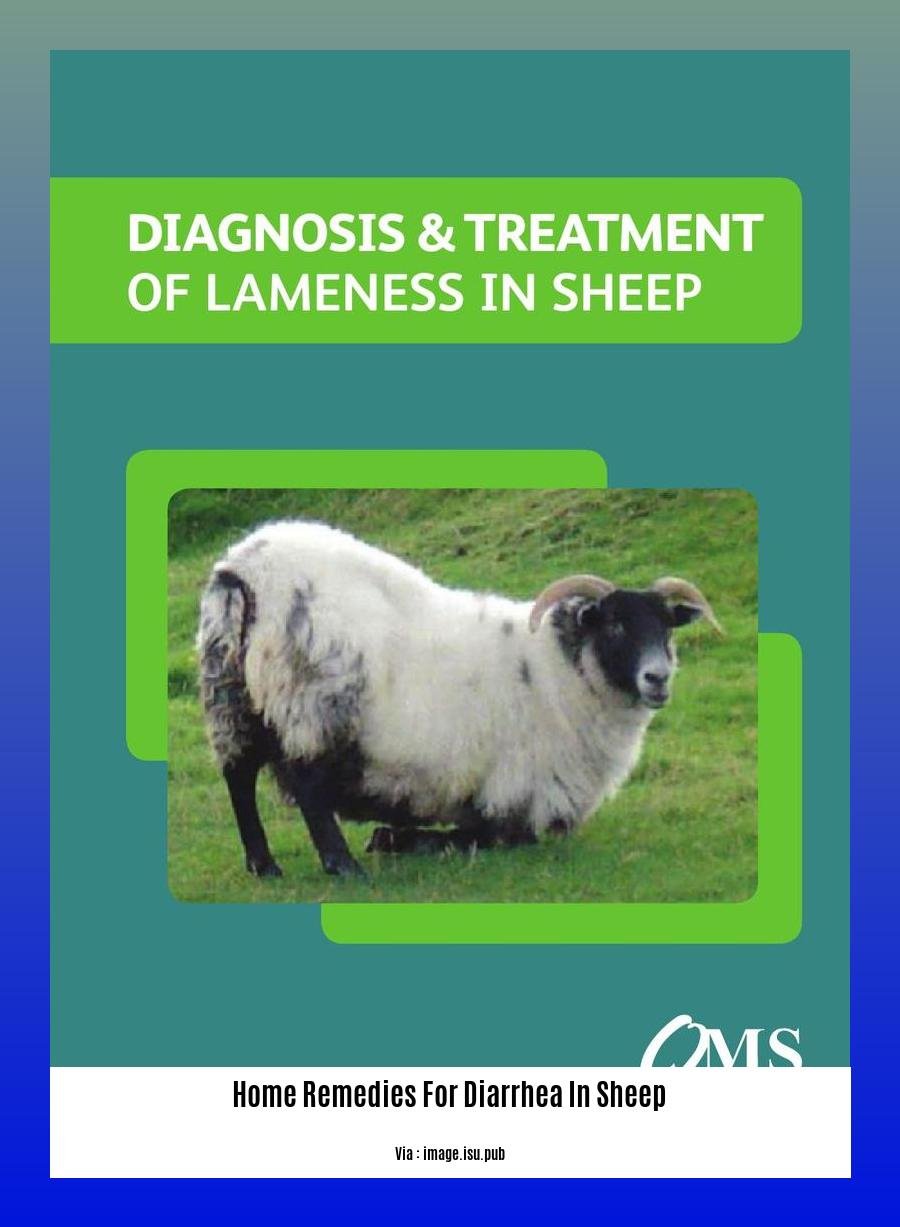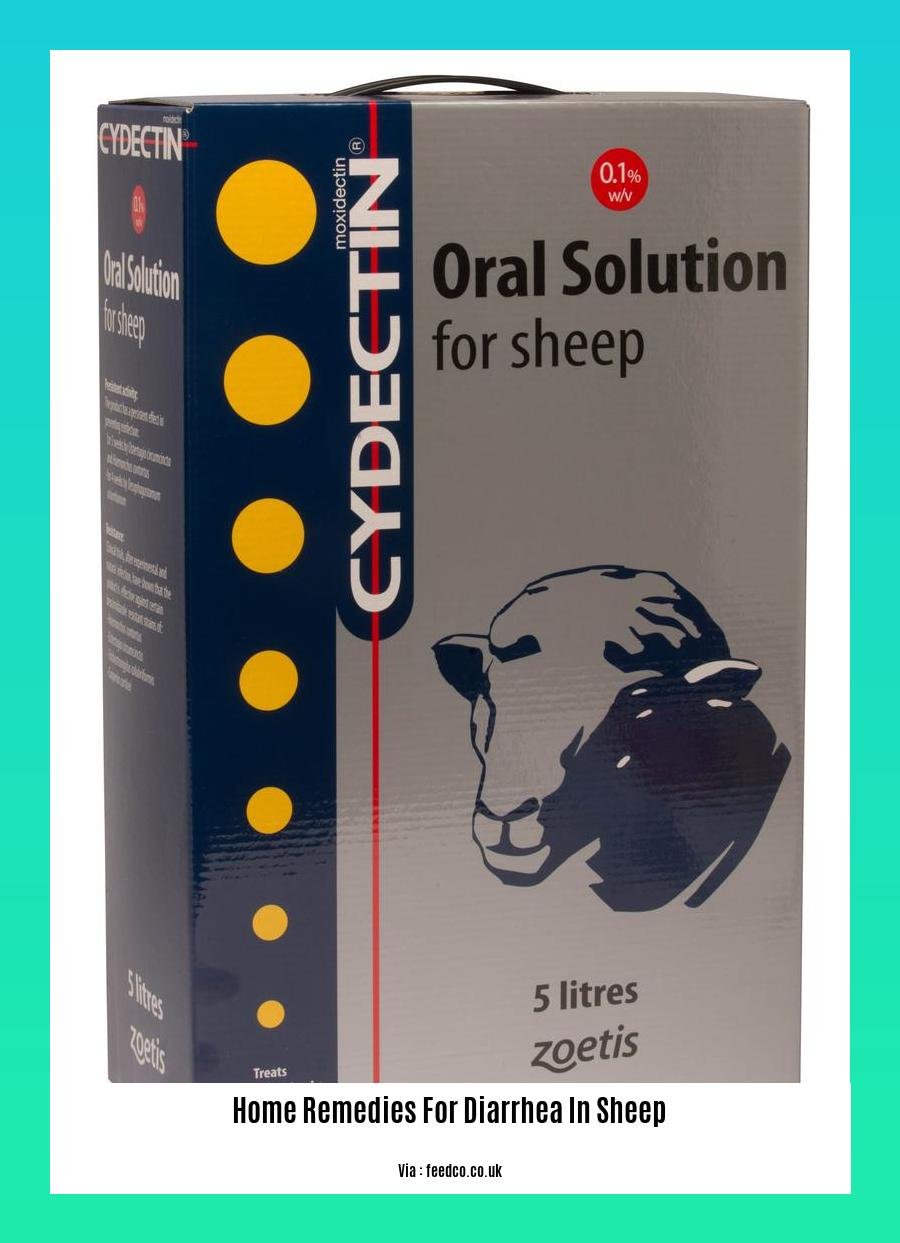Suffering from diarrhea can severely affect the well-being of your sheep, causing discomfort and potentially leading to dehydration and malnutrition. [Home Remedies for Diarrhea in Sheep: A Guide to Restoring Digestive Balance] provides practical solutions using natural ingredients to soothe your animal’s stomach and restore its digestive balance. Read on to discover time-tested methods for treating diarrhea in sheep, empowering you to provide effective care for your flock.
Key Takeaways:
- Separate sick sheep from healthy ones to prevent the spread of infection.
- Provide a clean and comfortable environment for the affected sheep.
- Administer activated charcoal to absorb toxins and reduce diarrhea.
- Offer electrolyte solutions to restore lost fluids and electrolytes.
- Clean the back legs of the sheep regularly to prevent blowfly strike.
- Feed the sheep high-quality, easily digestible forage like grass hay.
- Avoid grains and rich legumes that can worsen diarrhea.
- Maintain a clean and dry environment for the sheep.
- Provide a balanced diet rich in nutrients.
- Implement routine vaccinations and deworming to prevent infections and parasites.
Additional Information:
- Refer to the article “Sheep and Lamb Diarrhea: How We Treat It?” for more detailed information.
- Consult the article “How Do You Treat Diarrhea In Sheep?” for specific treatment options and preventative measures.
Home Remedies for Diarrhea in Sheep

Diarrhea in sheep can be a bothersome and potentially serious issue, leading to dehydration and electrolyte imbalances. Fortunately, various home remedies can help manage and alleviate this condition.
1. Proper Environment and Isolation
- Separate affected sheep from healthy ones to prevent the spread of infection.
- Provide a clean, dry, and comfortable area for the sick sheep to rest.
- Ensure access to clean water and high-quality forage.
2. Activated Charcoal and Electrolyte Solutions
- Administer activated charcoal to absorb toxins and reduce diarrhea.
- Offer electrolyte solutions to replenish lost fluids and electrolytes.
3. Nutritional Support
- Feed the affected sheep a bland diet of easily digestible forage, such as grass hay.
- Avoid grains and rich legumes, as they can worsen diarrhea.
- Provide fresh and clean water at all times.
4. Back Leg Cleaning and Hygiene
- Regularly clean the back legs of the sheep to prevent blowfly strike, which can cause further infection.
- Maintain a clean and sanitary environment to minimize the risk of infection.
5. Home Remedies for Diarrhea
- Apple Cider Vinegar: Dilute apple cider vinegar with water and offer it to the sheep. Its antimicrobial properties may help alleviate diarrhea.
- Yogurt or Probiotics: Probiotics can help restore the balance of beneficial bacteria in the gut. Offer plain yogurt or probiotic supplements to the sheep.
- Chamomile Tea: Chamomile possesses anti-inflammatory properties that may help soothe the digestive system. Brew chamomile tea, let it cool, and offer it to the sheep.
- Fresh Garlic: Garlic has antibacterial and antiviral properties. Crush a clove of garlic and mix it with honey or water. Administer this mixture to the sheep.
6. Preventive Measures
- Vaccinate sheep regularly to protect them from common diseases that can cause diarrhea.
- Deworm sheep periodically to prevent parasite infestations that can lead to diarrhea.
- Provide a clean and dry environment for the sheep to minimize the risk of infection.
- Implement a balanced feeding program to ensure the sheep receive adequate nutrients.
Conclusion
Home remedies can be effective in managing diarrhea in sheep. However, it’s important to consult a veterinarian if the condition persists or worsens to rule out underlying medical issues and determine the most appropriate treatment plan.
-
Are you struggling with a cold during pregnancy? Find soothing and natural home remedies to alleviate your symptoms and promote a healthy pregnancy. home remedies for cold during pregnancy
-
Does your beloved dog suffer from a persistent cough and cold? Explore a collection of simple yet effective home remedies that can help ease their discomfort and restore their playful spirit. home remedies for dog cough and cold
-
Concerned about your dog’s skin irritation and rashes? Discover a range of natural and gentle home remedies that can soothe their skin, promoting healing and restoring their comfort. home remedies for dog rash
-
Is your dog experiencing an upset stomach or vomiting? Find a selection of safe and effective home remedies to alleviate their symptoms and support their digestive health. home remedies for dog sickness
Herbal remedies and their administration

In the world of sheep farming, diarrhea is a common health concern that can disrupt the well-being of your flock. As a trusted veterinarian, I’ve seen firsthand the positive impact of herbal remedies in combating this issue. These natural solutions can alleviate symptoms, boost immunity, and restore digestive balance in your sheep. Let’s delve into some effective herbal remedies and their administration methods:
Key Takeaways:
- Herbal remedies can be powerful allies in managing sheep diarrhea.
- Always consult a veterinarian before administering any herbal treatment to your sheep.
- Carefully observe your sheep for any adverse reactions to herbs.
- Combine herbal remedies with proper nutrition, hygiene, and veterinary care for optimal results.
Choosing the Right Herbs:
Selecting the appropriate herbs for treating diarrhea in sheep is crucial. Here’s how to make informed choices:
- Consider the Underlying Cause: Determine the root cause of diarrhea (e.g., infections, parasites, dietary changes) to choose targeted herbs.
- Choose Herbs with Proven Efficacy: Look for herbs with a history of use in treating diarrhea and digestive ailments in sheep.
- Consult a Veterinarian or Herbalist: Seek advice from a qualified professional to ensure safe and effective herbal administration.
Administration Methods:
There are several ways to administer herbal remedies to sheep:
- Oral Drench: Mix the herbal remedy with water and administer it directly into the sheep’s mouth using a drenching gun.
- Feed Supplements: Incorporate herbal remedies into the sheep’s feed. This method is suitable for herbs that need to be consumed over an extended period.
- Topical Application: Some herbs can be applied directly to affected areas, such as the skin or wounds.
Recommended Herbal Remedies:
Here are some commonly used herbal remedies for sheep diarrhea:
- Slippery Elm: Known for its soothing and anti-inflammatory properties, slippery elm can help alleviate irritation in the digestive tract.
- Garlic: Garlic possesses antibacterial and antiviral properties, making it effective against infections that cause diarrhea.
- Fenugreek: Fenugreek aids in digestion and reduces inflammation in the gut.
- Chamomile: Chamomile’s calming properties can help soothe the digestive system and reduce stress-related diarrhea.
- Peppermint: Peppermint’s antimicrobial and antispasmodic properties help relieve digestive discomfort and gas.
Precautions:
- Start Slowly: Begin with small doses of the herbal remedy and gradually increase the amount over time to minimize the risk of adverse reactions.
- Monitor Your Sheep: Keep a close eye on your sheep for any signs of discomfort or allergic reactions. Discontinue use immediately if you notice any adverse effects.
- Avoid Overdosing: Strictly follow the recommended dosage instructions to prevent potential toxicity.
Remember, herbal remedies are complementary treatments and should not replace veterinary care. Always consult your veterinarian before administering any herbal remedies to your sheep, especially if they are pregnant, lactating, or have underlying health conditions.
[Sources]
– Sheep and Lamb diarrhea: How we treat it…
- There are natural, home remedies for sheep, goat and cattle diarrhea…
Electrolyte and Fluid Therapy: Restoring Balance in Sheep Diarrhea
Diarrhea in sheep can be a distressing issue for farmers, leading to dehydration and electrolyte imbalance. As a veterinarian specializing in ruminant health, I’ve encountered numerous cases of sheep diarrhea and helped farmers effectively manage it with rehydration therapy.
Key Takeaways:
- Swift Response: Acting promptly is crucial to prevent complications from diarrhea.
- Oral Rehydration: Providing a simple solution of warm water, salt, and sugar can replenish lost fluids and electrolytes.
- Electrolyte Supplements: Commercial electrolyte products can aid in restoring the sheep’s electrolyte balance.
- Careful Monitoring: Observe the sheep’s response and consult a veterinarian if diarrhea persists.
1. Assess the Situation:
Start by examining the sheep’s condition. Look for signs of dehydration, such as sunken eyes and dry mucous membranes.
2. Prepare the Rehydration Solution:
- Mix the following ingredients:
- 1 liter of warm water (body temperature, approximately 100°F)
- 2 tablespoons of salt
- 8 tablespoons of sugar
3. Administer the Solution:
- Use a clean syringe or bottle to administer the solution orally to the sheep.
- The amount to administer depends on the sheep’s size and condition. Aim for approximately 500-1000 milliliters per day.
4. Offer Electrolyte Supplements:
If the diarrhea is severe or the sheep is not responding well to the rehydration solution, consider using commercial electrolyte supplements designed for sheep. Follow the manufacturer’s instructions for dosage and administration.
5. Monitor the Sheep’s Response:
Keep a close eye on the sheep’s condition. If diarrhea persists or worsens, consult a veterinarian immediately.
Sources:
Merck Veterinary Manual: Diarrhea in Sheep and Goats
Sheep and Goat Diarrhea: Causes, Symptoms, and Treatment
Hygiene and sanitation practices
Sheep with diarrhea can easily spread bacteria and other harmful microorganisms, potentially infecting other animals and humans. Implementing proper hygiene and sanitation practices is crucial for preventing the transmission of diseases and promoting the overall health of the sheep.
Key Takeaways:
- Maintaining a clean environment: Regularly clean and disinfect sheep pens, feeders, and water troughs to prevent the spread of bacteria and parasites.
- Isolating infected sheep: Separate sheep with diarrhea from the rest of the flock to prevent the spread of the infection.
- Footbaths: Set up footbaths filled with a disinfectant solution at entrances and exits of sheep pens to minimize the spread of infectious agents on their hooves.
- Properly dispose of manure: Collect and properly dispose of manure away from the grazing areas and water sources to prevent contamination.
- Regular health checks: Regularly inspect sheep for signs of diarrhea and other health issues to ensure early detection and treatment.
Sources:
- Government of Western Australia Department of Primary Industries and Regional Development – Sheep and goat diarrhea
- Merck Veterinary Manual – Diarrhea in Sheep and Goats
FAQ
Q1: What are the most common causes of diarrhea in sheep?
A1: Diarrhea in sheep can result from various factors, including abrupt changes in diet, parasitic infections, bacterial infections, viral infections, and certain poisonous plants. Identifying the cause is crucial for effective treatment.
Q2: How can I prevent diarrhea in my sheep?
A2: Preventive measures include maintaining a clean and hygienic environment, providing a balanced diet rich in nutrients, implementing routine vaccinations and deworming to control infections and parasites, and avoiding sudden changes in their diet.
Q3: When should I seek professional veterinary assistance for my sheep’s diarrhea?
A3: If home remedies fail to alleviate diarrhea within 24-48 hours, or if the sheep displays severe symptoms like lethargy, loss of appetite, or bloody stool, immediate veterinary attention is necessary.
Q4: What natural remedies can I try at home to treat my sheep’s diarrhea?
A4: Effective home remedies include offering activated charcoal to absorb toxins, providing electrolyte solutions to restore lost fluids and minerals, and ensuring access to clean and fresh water. High-quality forage and probiotics can also support digestive health.
Q5: How can I ensure my sheep recovers quickly from diarrhea?
A5: During recovery, focus on rehydration, provide a balanced diet, avoid feeding concentrate feed, and maintain a clean and stress-free environment. Monitor the sheep closely and consult a veterinarian if symptoms persist or worsen.
- Best Color Backsplash For White Cabinets: Ideas Youll Love - November 27, 2025
- White On White Backsplash: A Timeless Kitchen Design Choice - November 26, 2025
- Tile Backsplash With White Cabinets: A Kitchen Design Guide - November 25, 2025










